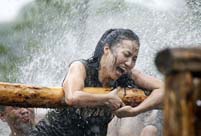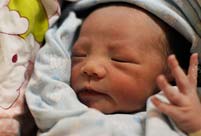 6 Chinese nurses win Florence Nightingale Medal
6 Chinese nurses win Florence Nightingale Medal
 Lady of mystery: Female SWAT team in prison disclosed
Lady of mystery: Female SWAT team in prison disclosed
 Tibetan ethnic costumes presented during tourism festival in NW China
Tibetan ethnic costumes presented during tourism festival in NW China
 Weekly selection of world photos (Aug.19-Aug.24)
Weekly selection of world photos (Aug.19-Aug.24)
 Boy pushed to air, 2 meters high by fountain in Huibei
Boy pushed to air, 2 meters high by fountain in Huibei
 Vintage cars exhibited at auto cultural festival in China's Shanxi
Vintage cars exhibited at auto cultural festival in China's Shanxi
 Military plane crashes in NE China
Military plane crashes in NE China
 Baby born to save his sister - the story of a savior sibling
Baby born to save his sister - the story of a savior sibling
 Those embarrassing copycat buildings
Those embarrassing copycat buildings
A Chinese anti-doping official has warned against local sport officials' attempts to challenge the anti-doping campaign ahead of the National Games.
The quadrennial key national sports meet kick off Sunday and doping still remain one of the biggest challenges to the games where medal winners reap greater rewards than at the international competition.
Stand-out performers also have a greater chance of making it to national teams, further increasing the inducement for athletes and coaches to seek unfair advantage.
Meanwhile, a provincial team's performance weighs heavily in its sport bureau's work and doping cases damage the chances for promotion which might lead to local officials' reluctance to punish offenders.
"Some local sport officials can not recognize the importance of doping control," said He Zhenwen, China's Anti-Doping Agency chief.
"They lobby around, or attempt to find our mistakes in the tests, thinking they may get away with it," he said.
Ahead of this year's games, a total of 12 athletes have been caught using performance-enhancing drugs, including one found through biological passport that monitors an athletes blood profile over time.
For the games, the organizers set up an anti-doping program which sees 2,575 doping tests, including 2,300 urine tests and 275 blood tests during the 12th National Games that run through to September 12.
There is a 10 percent raise in number of tests and the biological passport program will be introduced into the quadrennial meet for the first time in the country's intensified efforts to weed out doping cheats.
Only a few doping cases emerged in the past two Games but remained topics until now.
In the only positive case in 2005 Games, China's leading distance runner Sun Yingjie insisted that she was framed.
A civil court ruled that another athlete spiked her drink with the drug the athlete claimed "was accidentally picked up in a public toilet and put in Sun's drink in order to help her with her competition".
Still, the 2003 world bronze medalist was banned for two years and her coach Wang Dexian was banned for life.
Four years later, another high profile doping case rocked the games as Wang Jing was stripped of her 100 national games title after her test returned positive result.
Wang, claiming she was set up, called for further investigation. Local police probed into the case with no significant outcome and Wang was banned for four years and kept out of the national team for life.
The national games, inaugurated in 1959, drew teams representing provinces, municipalities and autonomous regions.
 August Full Moon celebrated across Greece
August Full Moon celebrated across Greece Top 10 Chinese provinces for the well-heeled
Top 10 Chinese provinces for the well-heeled  Fan Bingbing poses for Malaysian magazine Citta Bella
Fan Bingbing poses for Malaysian magazine Citta Bella Fairytale destinations around world
Fairytale destinations around world Wild dream: Hell-like training for bodyguard
Wild dream: Hell-like training for bodyguard  Zhang Xinyi covers COSMOPOLITAN
Zhang Xinyi covers COSMOPOLITAN China’s weekly story
China’s weekly story  The story of a savior sibling
The story of a savior sibling A collection of bizarre rooftop buildings around China
A collection of bizarre rooftop buildings around China 100th birthday of 'Little Mermaid'
100th birthday of 'Little Mermaid' Escort taskforce holds live-fire training
Escort taskforce holds live-fire training Death toll climbs to 76 in flood of NE China's Fushun
Death toll climbs to 76 in flood of NE China's Fushun Nokia's Global Headquarters: visiting a declining empire
Nokia's Global Headquarters: visiting a declining empire 2013 Taiwan Int'l Tourism Expo kicks off in Taipei
2013 Taiwan Int'l Tourism Expo kicks off in Taipei Photo story: Take a gap year
Photo story: Take a gap yearDay|Week|Month